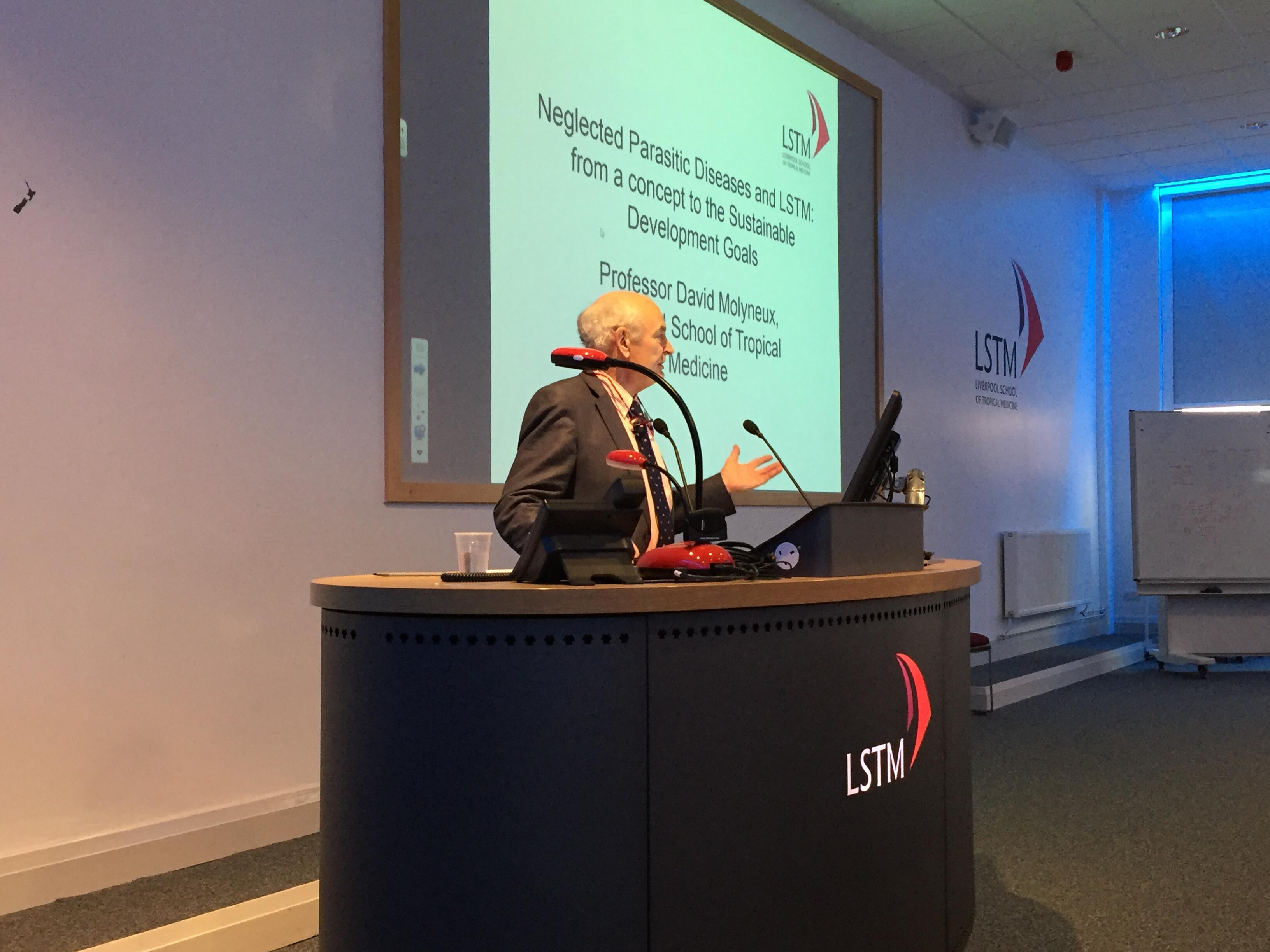
LSTM’s Seminar Series continued this week with a seminar by Professor David Molyneux, Emeritus Professor and Senior Professorial Fellow at the Liverpool School of Tropical Medicine. His talk entitled Neglected parasitic diseases and LSTM: From a concept to the Sustainable Development Goals was delivered to staff and students, and was introduced by Dr Joseph Turner, Senior Lecturer in Parasitology.
He began by reflecting on the evolution of what he now describes as the chronic pandemic of neglected tropical diseases (NTDs), which effect over 1 Billion people annually, and their relevance to the legacy of LSTM. It was Joseph Everett Dutton who in 1902 was the first to identify human trypanosomes in the blood of a patient from the Gambia. Dutton tragically died in what is now the Democratic Republic of Congo in 1905 studying sleeping sickness. David Molyneux went on to point out that right up until the present day, LSTM has had an association with trypanosomiasis, developing all the drugs used regularly up until the last 20 years and currently involved in control programmes using Tiny Targets. Trypanosomiasis is not the only NTD with which LSTM has a long association as it was Professor Donald Blacklock in 1926 who first described the transmission of Onchocerciasis, from its vector of the blackfly.
It was during one of LSTM’s first expeditions to West Africa that the filarial parasites which cause lymphatic filariasis (LF) were first identified in the Anopheles gambiae, and LSTM’s association with the disease and its treatment continues until today. Professor Molyneux continued by looking at LSTM’s history in relation to cutaneous leishmaniasis, and the drugs and diagnostics developed here which are still currently in use.
He discussed the evolution of the NTD concept, originally a group of disparate diseases and how they developed as a “brand” in 2005 with several colleagues working with WHO to emphasise the commonalities and opportunities for their control following the recommendations of the Africa Report, USAID and DFID funding the publication of the WHO Roadmap and the London Declaration of 2012. He explained the importance of the role of Director General of WHO, Dr Margaret Chan, who recognised the link between NTDs, poverty, equity and Universal Health Coverage playing a leadership stance at the highest level. Professor Molyneux explained the relationship that NTDs have across most of the current Sustainable Development Goals (SDGs), as he has often described them as the true markers of poverty. He warned however that there is a tendency to underreport numbers and to dismiss the importance of NTDs as they have been perceived previously as not killing people. He pointed out that during the recent outbreak of Ebola in West Africa that while over 11,000 people died, at least 12 times that number died as a result of NTD in the same period.
Professor Molyneux says that the potential turning point for these diseases has been the donations from large pharmaceutical companies of free drugs for mass drug administration programmes, which equates to more than 2 billion USD annually. This combined with international alliances formed for most of these diseases have meant that providing drugs to the public equates to only between 1-3% of a countries health budgets.
He concluded by talking about the successes and challenges of ongoing programmes reminding the audience of the interactions between these diseases and education, nutrition, water and sanitation. All elements of the poverty cycle. He also stressed the huge number of annual treatments delivered which is unprecedented in public health terms. He concluded by stating he believed that we are on the brink of something important and that it is vital that momentum is maintained, for as he says if we can’t deliver free drugs to poor people at the cost of a few pence we will have difficulty solving the many other challenges of public health.
A recording of the Seminar can be found here: